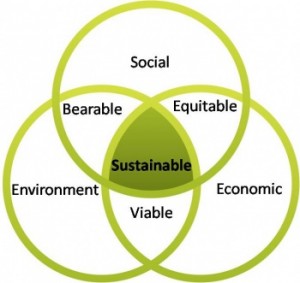 In today’s world sustainability “sits at the junction between strong community relations, a positive environmental outlook and financial well-being”. Being “Sustainable” is not new to Farmers who have historically respected the land and naturally learned to operate sustainably in order to survive and grow.
In today’s world sustainability “sits at the junction between strong community relations, a positive environmental outlook and financial well-being”. Being “Sustainable” is not new to Farmers who have historically respected the land and naturally learned to operate sustainably in order to survive and grow.
But now, due to the continuing increase cost of; water, fuel, labor, chemicals, and transportation along with the added government regulations, the farmer has seen their margins erode. Farmers need to push nature to maximize yield/acre while minimizing costs through the utilization of new technologies that allow more accurate automated control.
The farmer needs to create a short list typically starting with what is the largest annual expense and working downward. They have to consider what current conditions affect these costs (ie: international fuel costs, etc) and what initiatives can be implemented to decrease these costs. Work outward from this list to determine what environmental attributes each initiative will have and confirm what is most important. Determine the capital needs for each initiative and weight each accordingly.
A “Sustainability Plan” will include integrating sustainable business practices into every day activities which will decrease your operational costs, mitigate risks and help you meet your increasing budget challenges immediately, not next year but now as you implement the sustainable initiatives.
How can Irrigation Automation Systems help?
Water management:
Arguably one of the most critical issues affecting the cranberry industry for four major reasons, 1. crop production, 2. environmental concerns, 3.costs and 4.regulatory scrutiny.” (Peter Jeranyama – UMass[2011 Chart Book])
Reduction of Labor:
Our IAS control systems will decrease the amount of time is spent on measuring and analyzing air and/or plant temperature, soil moisture, water table level, engine/pump performance and operation. Knowing engine or pump usage and operational data you can more accurately schedule preventative maintenance extending the life of your mechanical equipment. It can eliminate the cost of travel and the time spent driving to the pump houses to start and stop the irrigation systems. You can improve community relations due to the natural resource savings as a result of utilizing our irrigation control system. The IAS control system will significantly decrease your labor costs by freeing up time and travel costs typically used to physically visit each pump house to start and stop the irrigation pumps = Labor Savings. By decreasing water and chemical usage you save water, chemicals mechanical wear and fossil fuel = Lower Operational Overhead.
Use Less Natural Resources:
It will decrease the natural resources used to maximize crop yield/acre. By controlling the irrigation water flow based on crop need more effectively utilize your number one regulated natural resource. This will decrease plant stress which will lead to higher production. Using the analytical data gathered by the system you can more cost effectively operate your Chemigation and Fermigation systems. This can prevent oversupply of chemicals that adversely affects the surrounding environment. With flow totalization you can verify water usage fulfilling regulatory requirements and confirming no resources are wasted. By decreasing irrigation system use you minimize polluting emissions caused by operating the pumps unnecessarily.
How To Receive the Highest Sustainability Rating:
The implementation of IAS solutions will assist the grower in receiving a higher sustainability rating helping them sell their crop to all users looking for growers who are most sustainable. The financial payoff as a result of obtaining the goals of the sustainability plan can be substantial, and will be received as you proceed with implementation. The major reward other than saving money is the knowledge that you have further protected the environment, maximized you stewardship of the land and created a legacy for future generations under your tenure.
The Three “P’s”:
 The “triple bottom line” leads to the Three “P’s” People – Planet – Profit which defines a sustainability formula. If we retrain ourselves and all decisions are made utilizing the “3P” formula we learn to create a sustainable culture and everyone wins. We provide a method of employment along with mental and physical sustenance to the employees, those people who use the crop and people who make up all the companies that support the growers (IAS-thank you). We are able to help the planet we all rely on to provide the substrate and natural resources to grow a crop. The decision provides value which has an acceptable ROI which generates a life cycle profit. Win Win Win!
The “triple bottom line” leads to the Three “P’s” People – Planet – Profit which defines a sustainability formula. If we retrain ourselves and all decisions are made utilizing the “3P” formula we learn to create a sustainable culture and everyone wins. We provide a method of employment along with mental and physical sustenance to the employees, those people who use the crop and people who make up all the companies that support the growers (IAS-thank you). We are able to help the planet we all rely on to provide the substrate and natural resources to grow a crop. The decision provides value which has an acceptable ROI which generates a life cycle profit. Win Win Win!
For additional resources see below.
- Click Here to see the Cape Cod Cranberries Growers Association Massachusetts Cranberry Industry SustainabilityReport
- Click Here to see the Wisconsin State Cranberry Growers Association; Wisconsin Cranberry Industry Sustainability Report
- Click Here to see Ocean Spray’s Sustainability Report.
- Click here for our IAS Sustainability Brochure
Contact us for any help with your sustainability plan.
 Login
Login